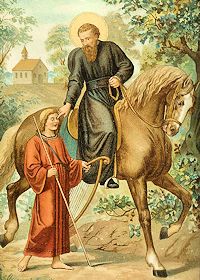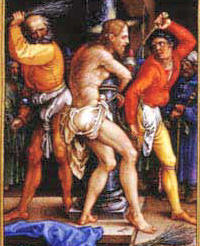Lent: March 26th
Friday of the Fifth Week of Lent
Other Commemorations: St. Ludger, Bishop (RM)
» Enjoy our Liturgical Seasons series of e-books!
"I am the light of the world. Whoever follows me will not walk in darkness, but will have the light of life (Jn 8:12)." Like the forty days' fast of the Ninevites, our Lent continues in complete confidence in divine mercy; but our hope is founded not so much on our poor efforts at penance but on the passion of our Savior. No one is excluded from the redemption effected by the Blood of Christ; His grace is promised to all who believe in Him.
Meditation
What do we do for the salvation of souls? It is true that we pray for one another, offer a few words of comfort, and do each other slight favors; but we do little more. Christ was more generous. He endured the crowning of thorns and dragged the heavy cross to Calvary. We pamper our bodies as if they were our last end. We prefer to have our heads crowned with laurels and roses. We are impatient and consider ourselves unfortunate whenever we are called on to carry a mere splinter of the cross of Christ. Are we one in spirit with Him?
Now, during Passiontide, we must begin to love and treasure pain and suffering. In the cross, in suffering, in our crucifixion with Christ, we shall find salvation. For Him and with Him we should bear all the slight injustices committed against us. For Him we should suffer freely and willingly the unpleasant and disagreeable things that occur to us. But our faith is weak. We flee from the cross instead of holding it dear, instead of loving it and welcoming it as our Savior did.
What St. Paul says of many Christians of his day is equally true of many in our time: "For many walk, of whom I have told you often (and now tell you weeping) that they are enemies of the cross of Christ. Whose end is destruction; whose God is their belly; whose glory is in their shame; who mind earthly things" (Phil. 3:18 f.).
Excerpted from The Light of the World by Benedict Baur, O.S.B.

The Station, at Rome, is in the church of St. Stephen on Monte Celio. This church of the great proto-martyr was chosen as the place where the faithful were to assemble on the Friday of Passion week.
St. Ludger
 St. Ludger was born in Friesland about the year 743. His father, a nobleman of the first rank, at the child's own request, committed him very young to the care of St. Gregory, the disciple of St. Boniface, and his successors in the government of the see of Utrecht. Gregory educated him in his monastery and gave him the clerical tonsure. Ludger, desirous of further improvement, passed over into England and spent four years and a half under Alcuin, who was rector of a famous school at York.
St. Ludger was born in Friesland about the year 743. His father, a nobleman of the first rank, at the child's own request, committed him very young to the care of St. Gregory, the disciple of St. Boniface, and his successors in the government of the see of Utrecht. Gregory educated him in his monastery and gave him the clerical tonsure. Ludger, desirous of further improvement, passed over into England and spent four years and a half under Alcuin, who was rector of a famous school at York.
In 773 he returned home, and St. Gregory dying in 776, his successor, Alberic, compelled our Saint to receive the holy order of priesthood and employed him for several years in preaching the Word of God in Friesland, where he converted great numbers, founded several monasteries, and built many churches.
The pagan Saxons ravaging the country, Ludger traveled to Rome to consult Pope Adrian II, what course to take, and what he thought God required of him. He then retired for three years and a half to Monte Casino, where he wore the habit of the Order and conformed to the practice of the rule during his stay, but made no religious vows.
In 787, Charlemagne overcame the Saxons and conquered Friesland and the coast of the Germanic Ocean as far as Denmark. Ludger, hearing this, returned into East Friesland, where he converted the Saxons to the Faith, as he also did the province of Westphalia. He founded the monastery of Werden, twenty-nine miles from Cologne.
In 802, Hildebald, Archbishop of Cologne, not regarding his strenuous resistance, ordained him Bishop of Munster. He joined in his diocese five cantons of Friesland which he had converted and also founded the monastery of Helmstad in the duchy of Brunswick.
Being accused to the Emperor Charlemagne of wasting his income and neglecting the embellishment of churches, this prince ordered him to appear at court. The morning after his arrival the emperor's chamberlain brought him word that his attendance was required. The Saint, being then at his prayers, told the officer that he would follow him as soon as he had finished them. He was sent for three several times before he was ready, which the courtiers represented as contempt of his Majesty, and the emperor, with some emotion, asked him why he had made him wait so long, though he had sent for him so often. The bishop answered that though he had the most profound respect for his Majesty, yet God was infinitely above him; that whilst we are occupied with Him, it is our duty to forget everything else. This answer made such an impression on the emperor that he dismissed him with honor and disgraced his accusers.
St. Ludger was favored with the gifts of miracles and prophecy. His last sickness, though violent, did not hinder him from continuing his functions to the very last day of his life, which was Passion Sunday, on which day he preached very early in the morning, said Mass towards nine, and preached again before night, foretelling to those that were about him that he should die the following night, and fixing upon the place in his monastery of Werden where he chose to be interred.
He died accordingly on the 26th of March, at midnight.
—Excerpted from Lives of the Saints, by Alban Butler, Benziger Bros. ed. [1894]
Symbols and Representation: bishop holding a cathedral; bishop holding a church and a book; bishop reciting his Breviary; bishop with a swan on either side; bishop with a goose or geese
Patronage: diocese of Essen, Germany; diocese of Münster, Germany; Billerbeck, Germany; Helmstedt, Germany; Münster, Germany; Saxony, Germany; Werden, Germany; Bant-Rutten, Netherlands; Deventer, Netherlands; Dronten, Netherlands; East Frisia, Netherlands; Groningen, Netherlands; Hengelo, Netherlands; Lichtenvoorde, Netherlands; Loenen, Netherlands.
Highlights and Things to Do:
- Read more about St. Ludger:






